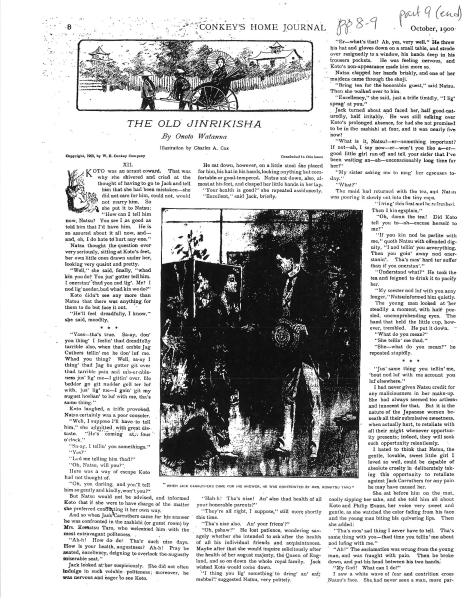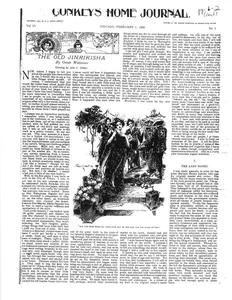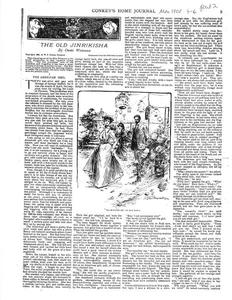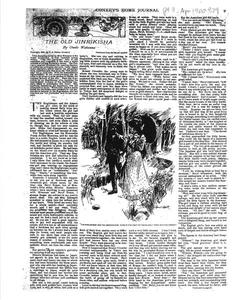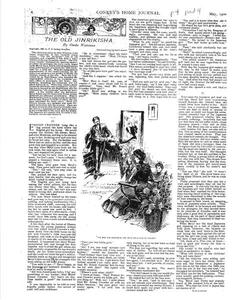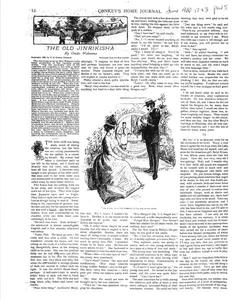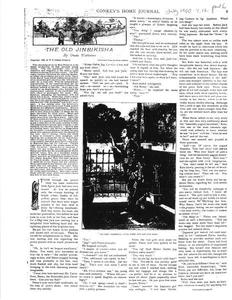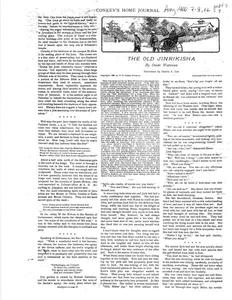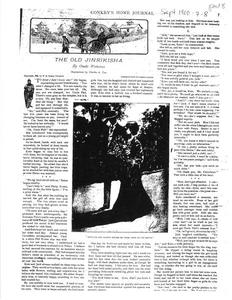XII.
Koto was an arrant coward. That was why she shivered and cried at the thought of having to go to Jack and tell him that she had been mistaken—-she did not care for him, could not, would not marry him. So she put it to Natsu: “How can I tell him now, Natsu? You see I as good as told him that I’d have him. He is so assured about it all now, and—-and, oh, I do hate to hurt any one.”
Natsu thought the question over very seriously, sitting at Koto’s feet, her own little ones drawn under her, looking very quaint and pretty.
“Well,” she said, finally, “whad kin you do? You jus’ gotter tell him. I onderstan’ thad you nod lig’. Me? I nod lig’ needer, bud whad kin we do?”
Koto didn’t see any more than Natsu that there was anything for them to do but face it out.
“He’ll feel dreadfully, I know,” she said, moodily.
“Yaes—-tha’s true. Sa-ay, don’ you thing’ I feelin’ thad dreadfully tarrible also, when thad Omble Jag Cuthers tellin’ me he don’ luf me. Whad you thing? Well, sa-ay I thing’ thad Jag he gotter git over thad tarrible pain and mis-er-able-ness jus’ lig’ me—-I gittin’ over. He bedder go git nudder gell ter luf with, jus’ lig’ me—-I goin’ git my august hosban’ to luf with me, tha’s same thing.”
Koto laughed, a trifle provoked. Natsu certainly was a poor consoler.
“Well, I suppose I’ll have to tell him,” she admitted with great distaste. “He’s coming at four o’clock.”
“Sa-ay, I tellin’ you somethings.”
“Yes?”
“Led me telling him thad!”
“Oh, Natsu, will you?”
Here was a way of escape Koto had not thought of.
“Oh, you darling, and you’ll tell him so gently and kindly, won’t you?”
But Natsu would not be advised, and informed Koto that if she were to have charge of the matter she preferred conducting it her own way.
And so when Jack Carruthers came for his answer he was confronted in the zashishi (or guest room) by Mrs. Komatsu Taro, who welcomed him with the most extravagant politeness.
“Ah-h! How do do! Tha’s such nize days. How is your health, augustness? Ah-h! Pray be seated, excellency, deigning to overlook the augustly miserable seat.”
Jack looked at her suspiciously. She did not often indulge in such voluble politeness; moreover, he was nervous and eager to see Koto.
He sat down, however, on a little stool she placed for him, his hat in his hands, looking anything but comfortable or good-tempered. Natsu sat down, also, almost at his feet, and clasped her little hands in her lap.
“Your health is good?” she repeated assiduously.
“Excellent,” said Jack, briefly.
“Hah-h! Tha’s nize! An’ also thad health of all your honorable parents?”
“They’re all right, I suppose,” still more shortly this time.
“Tha’s nize also. An’ your frien’s?”
“Oh, pshaw!” He lost patience, wondering savagely whether she intended to ask after the health of all his individual friends and acquaintances. Maybe after that she would inquire solicitously after the health of her august majesty, the Queen of England, and so on down the whole royal family. Jack wished Koto would come down.
“I thing you lig’ something to dring’ an’ eat, mebbe?” suggested Natsu, very politely.
“Er—-what’s that? Ah, yes, very well.” He threw his hat and gloves down on a small table, and strode over resignedly to a window, his hands deep in his trousers pockets. He was feeling nervous, and Koto’s non-appearance made him more so.
Natsu clapped her hands briskly, and one of her maidens came through the shoji.
“Bring tea for the honorable guest,” said Natsu. Then she walked over to him.
“Excellency,” she said, just a trifle timidly, “I lig’ speag’ at you.”
Jack turned about and faced her, half good-naturedly, half irritably. He was still sulking over Koto’s prolonged absence, for had she not promised to be in the zashishi at four, and it was nearly five now?
“What is it, Natsu?—-er—-something important? If not--ah, I say now-—er—-won’t you like a-—er-—good little girl run off and tell your sister that I’ve been waiting an--ah--unconsciously long time for her?”
“My sister asking me to mag’ her egscuses today.”
“What?”
The maid had returned with the tea, and Natsu was pouring it slowly out into the tiny cups.
“Dring’ this first and be refreshed. Then I kin egsplain.”
“Oh, damn the tea! Did Koto tell you to—-ah—-excuse herself to me?”
“If you kin nod be perlite with me,” quoth Natsu with offended dignity, “I nod tellin’ you aeverything. Then you goin’ away nod onerstanin’. Tha’s mos’ hard ter suffer than if you onerstan’.”
“Understand what?” He took the tea and feigned to drink it to pacify her.
“My seester nod luf with you aeny longer,” Natsu informed him quietly.
The young man looked at her steadily a moment, with half puzzled, uncomprehending eyes. The hand that held the little cup, however, trembled. He put it down.
“What do you mean?”
“She tellin’ me thad.”
“She—-what do you mean?” he repeated stupidly.
“Jus’ same thing you tellin’ me ‘bout nod luf with me account you luf elsewhere.”
I had never given Natsu credit for any maliciousness in her make-up. She had always seemed too artless and innocent for that. But it is the nature of the Japanese women beneath all their submissive sweetness, when actually hurt, to retaliate with all their might whenever opportunity presents; indeed, they will seek such opportunity relentlessly.
I hated to think that Natsu, the gentle, loving, sweet little girl I loved so well, could be capable of absolute cruelty in deliberately taking this opportunity to retaliate against Jack Carruthers for any pain he may have caused her.
She sat before him on the mat coolly sipping her sake, and she told him all about Koto and Philip Evans, her voice very sweet and gentle, as she watched the color fading from his face and the young man biting his quivering lips. Then she added:
“Tha’s mos’ sad thing I aever have to tell. Tha’ same thing with you—-thad time you tellin’ me about nod lufing with me.”
“Ah!” The exclamation was wrung from the young man, and was fraught with pain. Then he broke down, and put his head between his two hands.
“My God! What can I do?”
I saw a white wave of fear and contrition cross Natsu’s face. She had never seen a man, more par-
9 ticularly a big strong man, break down, and weep, yes, actually seem to weep. No Japanese man ever could do that. She did not know what to do. Her conscience was paining her dreadfully now, and yet she knew if she had not told him, Koto would have had to.
“Mister Jag—-Jag—-Omble Jag Cuthers,” she said, kneeling beside him; “oh! all the gods in the skies, forgive me thad I mek you suffering so.”
The young man lifted his haggard face from his hands, and tried bravely to smile at her.
“Oh, don’t, Natsu,” he said shakily, “it wasn’t your fault. I—-I understand.”
“Ah-h, yaes, alas, you onderstan’. Tha’s breagin’ your heart all daed.”
“Oh, I’m all right,” he pushed his fingers wearily through his hair, “I don’t know what else I expected,” he groaned and walked across the room with a slow, uncertain stride. Natsu trotted after him, wringing her hands with sympathy and distress.
“Sa-ay, Omble Jag—Mister Jag—-excellency—-sa-ay I goin’ tell you something—-lo, I—-I kin comfort with you.”
He smiled through his misery at her concern.
“Sa-ay—-suppose you gitting nudder nize beautifullest ladies to luf with you. My seester,” she threw a disparaging note into her voice now, “she nod vaery nize—-nod vaery—-jus’ liddle bit. No—-nod liddle bit whicheven—-mos’ augustly homely womans in all the whole worl’. Now I egspeg some nize beautifullest ladies goin’ to lig’ with you if you letting. No, don’ shake your honorable heads, you thing nod? Well me? I thing’ nod also thad times you-—whad is thad? Ah, yaes—- jilting with me. Well me? I git my august hosban to luf with me jus’ same way, an’ lo, I am jus’ same habby also.” She ended triumphantly.
Jack picked his hat, stick and gloves up, and held them in one hand as he took Natsu’s little ones, which were both outstretched in the other.
“Good-bye, Natsu—-tell her that—-that you delivered her message, and ah-—I said—” he broke down here, and went out with the sentence unfinished.
Koto came through the shoji, shivering. She flung herself down on a couch and burst into tears, sobbing bitterly.
“Oh, oh, I heard it all. It was cruel. I—-Natsu, how could you do it? How—-”
“Thad is cruel,” said Natsu, gravely, “bud whad could I do? You ask me to telling, an’ I telling. Tha’s all.” There was a guilty tremor to her voice, however.
“But—-but your voice—-you seemed cold and unfeeling.”
Natsu shrugged her shoulders.
“Tha’s nod me he luf,” she said.
She poured out a delicious cup of hot sake and gave it to her sister, brushing the hair tenderly back from the somewhat fevered head, as she made her drink it.
When Phil Evans finally arrived he found the two girls sitting together in complete silence. There were tear traces on both their faces.
“I met Jack in the road,” he said gravely.
He sat down close to Koto. “You told him?”
“No, I could not. Natsu did so for me.”
“Natsu!”
“Yes, I hadn’t the courage.”
Phil Evans made no comment, and after a moment the girl continued, her voice breaking, “Oh, Phil, I feel so conscience-stricken and wicked about it all. I almost wish I had seen him myself, though it might not have mended matters.”
“No,” said Phil slowly, “it would not have altered things. I only wonder he did not insist on seeing you.”
“He never was entirely sure of me, you know.”
After a moment she said, “Phil, dear, you—-you don’t think he will do anything rash,” with a girlish vivid recollection of the sensational love stories the girls had indulged in at the school.
“Oh, no, of course not. He’ll get over it. An Englishman generally has plenty sand and grit.”
When Phil Evans returned to the hotel that night some lounger about the hotel told him that Jack Carruthers had left only a few hours before for Nagasaki, from whence he proposed sailing for England.
And that is the last I heard of the Honorable Jack Carruthers.
